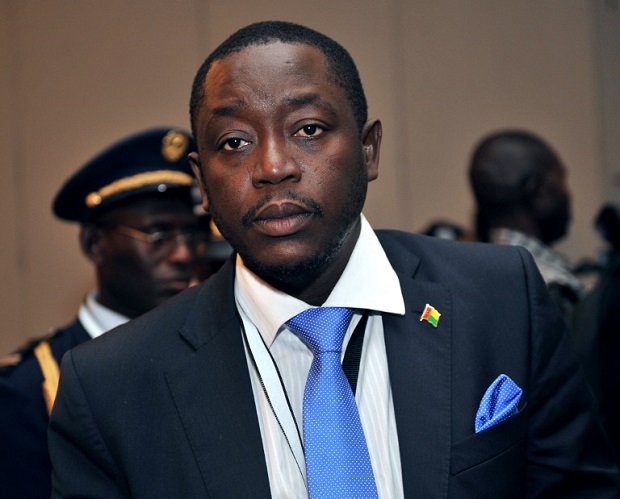
This file picture taken on April 12, 2012 shows Guinea Bissau’s Minister of Defence Baciro Dja looking on following reports of a coup attempt in Bissau, after an extraordinary session of The Economic Community of West African States (ECOWAS) concerning regional security in Abidjan. Guinea-Bissau’s new Prime Minister Baciro Dja on August 24, 2015 sacked the chiefs of the state-owned radio and television services for “bias” in their reporting of a recent government shake-up. AFP PHOTO
BISSAU, Guinea-Bissau—Guinea-Bissau lawmakers on Monday adopted a proposal to try and get rid of the country’s new prime minister through legal means in a bid to resolve a political crisis over his appointment.
After 12 hours of intense debate in the National Assembly, the lawmakers adopted the proposal in which they “express their disagreement with the nomination of Prime Minister Baciro Dja” last week.
They decided to “attempt actions with a view to deposing the new prime minister” in a resolution adopted by 75 of 79 lawmakers present from the country’s 102-seat parliament.
Lawmakers will present the resolution to President Jose Mario Vaz, and if he ignores it, they plan to take up the issue with the Supreme Court.
Dja was appointed after Vaz fired his predecessor Domingos Simoes Pereira, angering the ruling party and plunging the chronically unstable nation into fresh crisis.
While all three men belong to the ruling African Party for the Independence of Guinea and Cape Verde (PAIGC)—which holds a slender majority in parliament—the bloc has fallen in line behind its leader Pereira in the dispute.
The lawmakers also urged Vaz to ask the PAIGC to nominate another prime minister after which the president must “consult with parties in parliament and an advisory body attached to the president’s office.”
After Pereira’s sacking, the ruling party renominated him, but to no avail.
Opposition lawmaker Victor Mandinga said that if the latest resolution was ignored, “the assembly will go to the Supreme Court to rule” on the dispute.
Meanwhile the president of neighboring Gambia Yahya Jammeh has offered to help find a solution to the crisis.
Members of the PAIGC and opposition Party for Social Renewal will head to Banjul on Wednesday to meet him, according to the Gambian ambassador in Bissau.
The political crisis is the latest to rock the west African nation which was hoping for stability after 2014 elections as it recovers from the latest in a long line of military coups in 2012.
Vaz said his fallout with Pereira stemmed partly from the appointment of a new armed forces chief, a key post in the small nation known as a hub in drug trafficking between South America and Europe.
The president also raised the closure of the border with Guinea over an Ebola outbreak and cited problems of corruption and nepotism, a lack of transparency in public procurement and alleged obstruction of the judiciary.